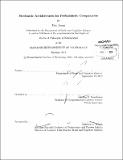Stochastic architectures for probabilistic computation
Author(s)
Jonas, Eric Michael
DownloadFull printable version (19.17Mb)
Other Contributors
Massachusetts Institute of Technology. Department of Brain and Cognitive Sciences.
Advisor
Joshua B. Tenenbaum.
Terms of use
Metadata
Show full item recordAbstract
The brain interprets ambiguous sensory information faster and more reliably than modern computers, using neurons that are slower and less reliable than logic gates. But Bayesian inference, which is at the heart of many models for sensory information processing and cognition, as well as many machine intelligence systems, appears computationally challenging, even given modern transistor speeds and energy budgets. The computational principles and structures needed to narrow this gap are unknown. Here I show how to build fast Bayesian computing machines using intentionally stochastic, digital parts, narrowing this efficiency gap by multiple orders of magnitude. By connecting stochastic digital components according to simple mathematical rules, it is possible to rapidly, reliably and accurately solve many Bayesian inference problems using massively parallel, low precision circuits. I show that our circuits can solve problems of depth and motion perception, perceptual learning and causal reasoning via inference over 10,000+ latent variables in real time - a 1,000x speed advantage over commodity microprocessors - by exploiting stochasticity. I will show how this natively stochastic approach follows naturally from the probability algebra, giving rise to easy-to-understand rules for abstraction and composition. I have developed a compiler that automatically generate circuits for a wide variety of problems fixed-structure problems. I then present stochastic computing architectures for models that are viable even when constrained by silicon area and dynamic creation and destruction of random variables. These results thus expose a new role for randomness and Bayesian inference in the engineering and reverse-engineering of computing machines.
Description
Thesis: Ph. D., Massachusetts Institute of Technology, Department of Brain and Cognitive Sciences, 2014. Cataloged from PDF version of thesis. Includes bibliographical references (pages 107-111).
Date issued
2014Department
Massachusetts Institute of Technology. Department of Brain and Cognitive SciencesPublisher
Massachusetts Institute of Technology
Keywords
Brain and Cognitive Sciences.